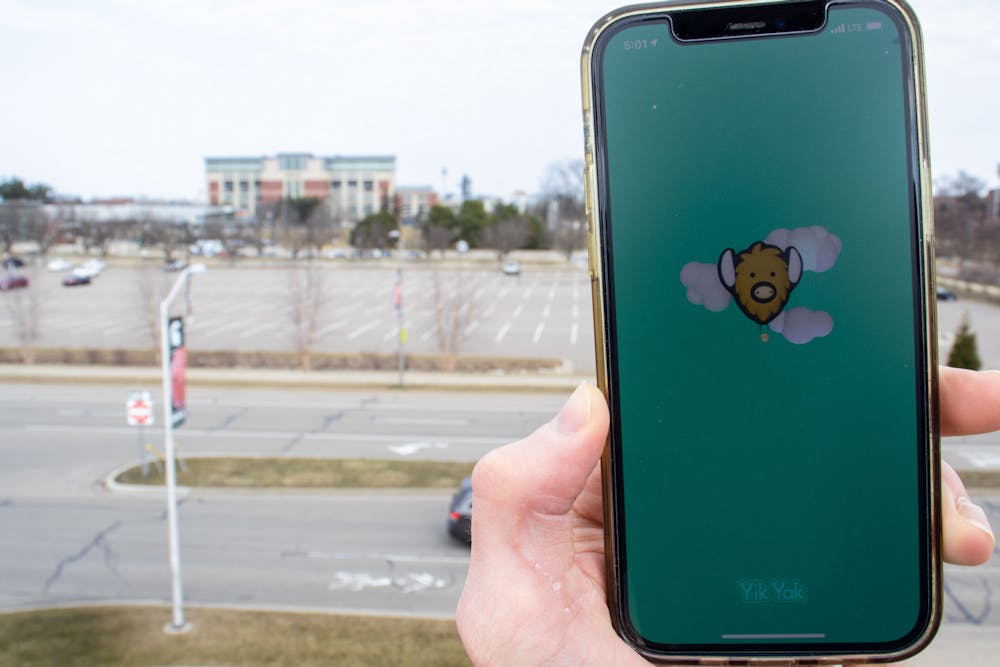In 2015, an MSU student made national news when he made an anonymous post on an app that said, “I’m gonna (gun symbol) the school at 12:15 p.m. today.” He was arrested within 45 minutes of making the post, which later led to felony terrorism charges.
The post was on YikYak — a social media app that allows people to post anonymously and view all discussion threads posted within a five-mile radius of the user. The app was shut down for threats of violence and harassment in 2017, disappearing from the app store for nearly four years before it became available for download again in 2021.
Due to its popularity on college campuses, YikYak’s return forces some students and faculty to question if the issues that led to its shutdown still persist.
“So it was obviously not anonymous,” media and information professor Ruth Shillair said. “There (are) ways they can easily track who you are if they want to.”
Even if the app was fully anonymous, anonymity in itself could impose a new series of risks. Shillair said she isn’t sure if the app’s “fundamental problems”— which the New York Times identified as posts involving body shaming, racism, sexual harassment and threats of gun violence and murder — have been solved, and she isn’t sure if it’s even possible to do so.
“We’re working really hard as faculty ... to create an atmosphere on the MSU campus that is truly supportive and helpful,” Shillair said. “Unfortunately, sometimes, people, when they feel they’re anonymous, will say things that are very unkind and thoughtless. (Anonymity) doesn’t tend to bring out the best in us.”
Inside the app, users can access what are called the “community guardrails.” These guidelines prohibit all of the following actions: identifying people and children, bullying and harassment, talking about suicide and self-injury, bigotry, violence and threats, criminal acts, democratic interference, fake news, sexual harassment, pornography, posting in any language besides English, and more. Yaks, or posts, that violate any of these rules, will be removed if they receive five downvotes or if a moderator condemns the post.
YikYak now claims to have a “one-strike” policy with serious infractions, which will result in the user being banned from the platform.
“Honestly, I haven’t seen anything too bad on there, so my guess is it’s pretty well-monitored,” journalism freshman Nate Pirrera said.”
Pirrera said he downloaded YikYak because he found a lot of the posts to be humorous, but he doesn’t see how the app has any positive influences, as opposed to other social media sites.
“There (are) sites like Reddit, for example, where it’s largely anonymous, but there (are) actual communities … that you can join and participate in,” Pirrera said. “In terms of YikYak, I don’t really see the benefit.”
Students often employ YikYak’s ability to reach across the entire campus to find parties on the weekends, filling the app’s feed with any variation of, “what frat is throwing tonight?” But even this seemingly innocent usage of the app can lead to dangerous situations.
“What if it’s an ex or somebody just trying to ... cause a problem?” Shillair said. “Because you could have hundreds of people show up at your yard and be upset because there’s no party, and they’re just using it to harass you or dox you. So it could be really nasty.”
Political science prelaw senior Shruti Pandey, who works on campus as a residential assistant, said she received warnings about YikYak from her bosses.
“Our bosses were very clear to tell us that it can be a harmful app and that a lot of students may be on it,” Pandey said.
Pandey referred to the app as a double-edged sword— while it gives students an outlet to speak their minds, it can easily serve as an echo chamber for harmful ideas. She said students should think twice if they read or feel the urge to post something negative.
“You can’t control what other people post, but you can control how you react to it and how you process that information,” Pandey said. “I think it’s just your job, as a consumer of media, to be aware that you need to think for yourself when you’re reading that.”
Support student media!
Please consider donating to The State News and help fund the future of journalism.
Discussion
Share and discuss “Anonymous YikYak app makes return, students and faculty worry about its influence” on social media.








